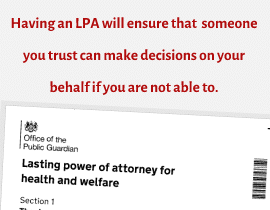Free Wills – pros and cons
We spend a lot of time explaining to people why they should have a Will, so we applaud any initiative that highlights the benefits of having one. However, we believe that having a Will that fully protects you and your specific requirements should be everyone’s ultimate aim.
Did you know that approximately two-thirds of adults in the UK do not have a valid Will?
If you do not have a valid Will, on your death you will be declared “intestate” and intestacy rules will apply. Topline, these rules allow only married or civil partners and some other close relatives to benefit from your estate, and any benefit they may get could take a long time, and a lot of work to arrive. Under this scenario, there is a high chance that people, such as a non-married partner or others that you want to benefit will not.
Having a valid Will – a legal document will ensure that your estate and assets will go to who you want and not be decided by someone else. As well as your financial estate, this also applies for other extremely important instructions such as; guardians for your children, instructions on pets, and even charitable gifts. (in the case of guardians for your children who looks after them could be decided by the Courts!)
If you are in doubt as to why you should have a Will, please view the short video below.
Pros of a free Will
- Ultimately it is a Will that will offer you a level of protection – which is good and has to be better than none at all.
- It’s free! Obviously, this is attractive.
Cons of a free Will
A free Will may not meet your needs and could possibly not fully protect your family or assets.
A basic free Will will on the whole, not take into account well-known threats that a bespoke or “full” Will covers. Depending on your and your beneficiary’s circumstances these threats could end up costing a great deal of money, sometimes in the hundreds of thousands of pounds, these threats include:
- Inheritance Tax – kicks in at £325k for a single person leaving their estate to someone other than a spouse.
- Intergenerational Inheritance Tax – where tax is compounded as the estate is passed down through generations.
- Marriage of your partner after your death – ensure that your children continue to be beneficiaries if your partner remarries.
- Divorce.
- Insolvency/Bankruptcy – ensure that your beneficiaries still benefit if they are in an unstable financial situation.
- Long-term care fees – there are scenarios where after your death it is possible that your partner may need to sell their home to pay for care home fees.
The following video outlines these threats:
If any of these threats are a concern to you, a free Will may not be the best option.
You should also be aware that the free Will providers will likely also try to sign you up for other services which are certainly not free – such as being the executor of your estate. There is nothing wrong with this but double-check the cost as they could be much higher than other options, a few extra percent on your total estate can be an incredible amount of money!
We undertake a full assessment of your assets, liabilities, and objectives. We then present you with options and prices. You are then free to take out all, some, or none of the recommendations.
Donation to charity
Charities may want to help you by giving a free Will, but of course, their objective is to try and secure a donation to their charity on your death. There is nothing wrong with this, and we fully support leaving legacies to charity and can draft such clauses too. In fact, giving to charity could help reduce the Inheritance Tax bill of your estate. Should you gift 10% or more of your estate to charity, your Inheritance Tax rate can be cut from 40% to 36%. We can draft a suitable Charitable Legacy clause to ensure this happens.
Further information on charitable legacies can be found on the government money advice service website.
Your Will is only one part of your estate planning
A Will forms only part of your potential estate planning. We fully review and make recommendations on your whole estate planning. This could also include:
- Lasting Powers of Attorney
- Trust establishment
- Professional executor service
- Professional probate service
..as well as protecting pension and life assurance lump sum payments, business succession planning and cross option arrangements.
Please contact us for more information or if you have any questions.
Useful links:
Our full suite of information videos
Further information on the rules of intestacy:
Government website: Intestacy – who inherits if someone dies without a will?
Citizen’s Advice Bureau – rules of intestacy, who will inherit.




